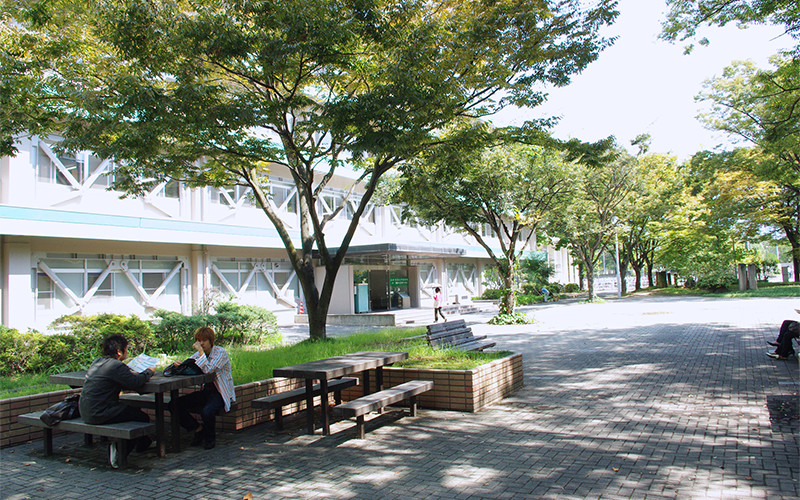
In order to flexibly respond to the diverse learning needs of students, the Graduate School of Humanities and Social Sciences lays out curricula that utilize characteristics of the academic fields, and thus fosters human resources who will lead the next generations.
In the Division of Law and Letters, specialized courses are set up as two-credit courses. In this way, we provide steady and step-by-step specialized education, and organize coursework that starts from research guidance to master’s thesis.
In the Division of Industrial Systems Management and Innovation, specialized courses are set up as one-credit courses. We offer practical problem-solving education by establishing project research courses in which issues provided by businesses and local governments are dealt with.
In addition, we organize curricula to meet various needs of students by systematically arranging coursework for the entire Graduate School, such as interdisciplinary course registration over the Division and the Courses (such as basic courses of the Graduate School and/or other courses in other Division/Courses) and elective course registration for career development.
Contents of course categories and registration outline
In line with the basic concepts and features of the organization of the curricula, the Graduate School of Humanities and Social Sciences has classified courses into six categories: “Basic Courses for the Graduate School,” “Basic Courses for the Division,” “Specialized Courses (Lecture or Theory),” “Specialized Courses (Seminar or Practice),” “Research Guidance,” and “Career Development Courses.”
Basic Courses for the Graduate School
In this category of courses, students acquire a broad range of thinking abilities by learning interdisciplinary knowledge including knowledge of fields other than their specialization in order to develop advanced versatile skills in the humanities and social sciences. “Introduction to Law and Politics,” “Introduction to Humanities,” “Introduction to Regional Industrial Society,” and “Field Research (Law and Letters)” are offered. “Field Research” is a self-designed course in which students participate in academic conferences, symposiums, seminars, and lectures held inside and outside the university to learn a wide range of findings in various research areas and produce reports on them.
Basic Courses for the Division
The courses in this category provide basic knowledge and skills that students of each Division must acquire in common, which are essential for research in their field of study.
The Division of Law and Letters offers “Basics of Law and Letters” and “Professional Research & Writing (Law and Letters)” for students to study the basics of law, politics, and humanities. The introduced workshop-style oral presentations and group work will enable them to acquire practical skills to willingly communicate.
The Division of Industrial Systems Management and Innovation provides “Basis for Quantitative Analysis,” “Business Management Basics,” and ” Professional Research & Writing (Industrial Systems Management and Innovation).” These will improve students’ quantitative analysis and management skills for solving problems along with skills that are essential to the information society.
Specialized Courses (Lecture or Theory)
Although this course category is based on lectures, the classes take flexible forms, such as literature reading, research presentation and discussion, research and analysis, depending on the nature of the academic fields. In accordance with educational characteristics of each major, specialized courses (lecture) are offered as two-credit courses in the Division of Law and Letters, whereas in the Division of Industrial Systems Management and Innovation, specialized courses (theory) are for one-credit.
Specialized Courses (Seminar or Practice)
This category offers rather practical courses that are given in a seminar style. The specialized courses (seminar) for the Division of Law and Letters are “Seminar” and “Project Seminar” (Law and Politics only), which are two-credit courses. The specialized courses (practice) of the Division of Industrial Systems Management and Innovation are “Project Research [Study] /Research Project” and “Seminar in Industrial Systems Management and Innovation” with one credit each.
Research Guidance
The courses in this category are led by an advisor in a seminar-style and offered to second-year students to prepare for writing Master’s thesis. In the Division of Law and Letters, “Professional Research in Legal Studies 1” and “Professional Research in Legal Studies 2” are offered for two credits each. In the Division of Industrial Systems Management and Innovation, “Master Thesis on Industrial Systems Management and Innovation” and “Project Practice Research” are offered as four-credit courses. Note that the “Project Practical Research” is a course only open to those students who have been admitted via Admission for Adult Education and Self-Recommendation Admission.
Career Development Courses
The courses in this category are for career development that is based on a view to the career paths after completion of the degree. Both Divisions will offer the courses “Toward the Realization of an Inclusive Society” and “Introduction to the Teaching Method”. In the Division of Law and Letters, “Internship” is offered with two credits. The Division of Industrial Systems Management and Innovation offers “Internship Practice,” “Special Lecture on Practical Skills,” and “Leaderships” with one credit each.
